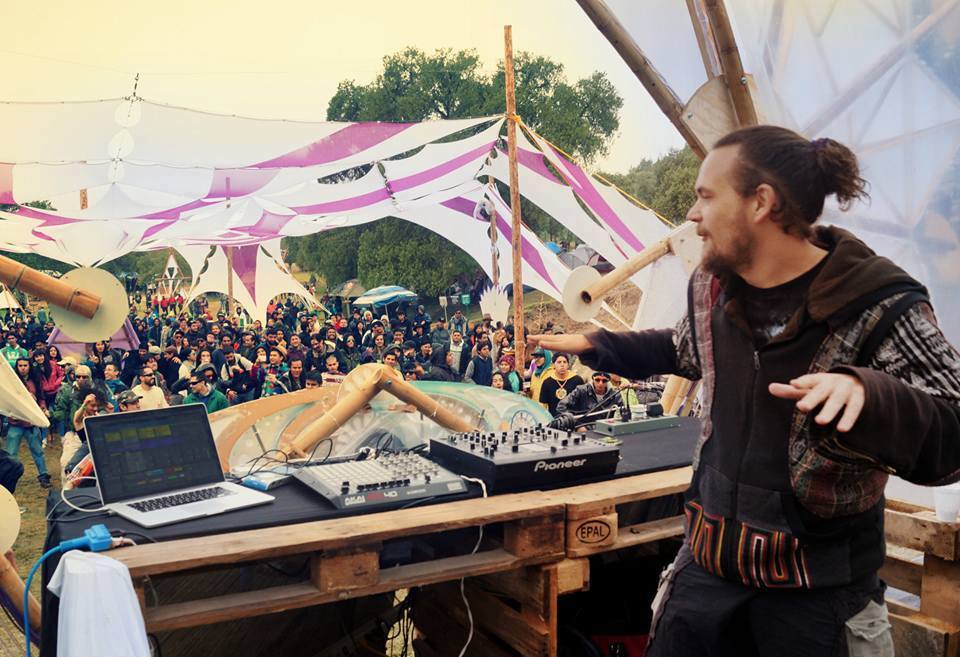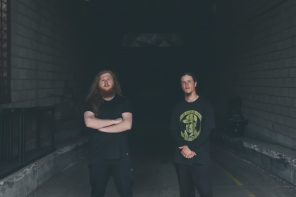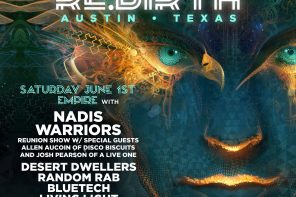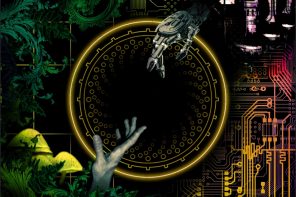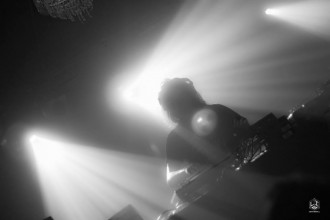An ever-evolving organism of an unintelligible makeup, underground electronic music refuses to be contained or understood through any single approach to sound. Melding decades of sonic heritage with the shapeshifting worlds of culture, philosophy, technology and art, electronic music cannot be defined with a search query and no sole track or artist can touch on its nearly limitless depth and potential. From the producer’s studio to the listener’s ears, this blooming sphere of aural experimentation is equally shaped by how it is observed and experienced, as by how it is designed and presented.
It is within this vast creative pond, where artists act as disturbance points triggering a mosaic of colorful waves across a dark and still surface, that we find Steve Young, aka Hedflux. An ex-academic and music hobbyist with over two decades at the helm of underground dance floors and festivals, this sonic pioneer has taken a page from the old masters of history in his style-bending pursuit of the next tier of art and sound. Occupying an increasingly brilliant space between psychedelic trance and groovy, bass-centric breaks, Hedflux’s funky and technical twists on modern electronica are pushing the boundaries of today’s most energetic genres into a luminous realm he aptly describes as “psy-tech-funk.”
Soon to grace the United States with his mesmerizing, hybrid sounds, Hedflux sat down with me to share some of his story and offer us a glimpse into his vision of today’s ever-changing musical landscape.
You’ve been traveling a lot over the last few weeks. Where are you now?
I just got back to Honduras after traveling up to Mexico and Guatemala. It was a crazy long road trip that tested my patience to it’s absolute limits, but in between the grueling days of travel which I will soon forget, there were some awesome and magical experiences that will stay with me forever. Central America has a lot of natural and ancient wonders, and has so much to teach us, but you have to make some sacrifices to get at it. “Convenient” is not a word I’ve used for a long time.
When you’re not on 15-hour bus rides traveling to different festivals and shows in Central America and Mexico from your current home in Honduras, what’s a day at home like?
My six-month stay in Honduras is in it’s final stretch now. I’ve been keeping my energy quite tight and living fairly remotely in the mountains. I’ve minimized my living expenses, distractions, touring, partying, etc. and focused on developing my music to a new level. Most days I’m just in the studio trying to break through the creative limits I had previously imposed on myself, developing my ideas into a releasable album while avoiding distractions as much as possible, and being a half-decent husband and father at the same time.
Have you always produced music under the name “Hedflux?” What was the inspiration behind this name?
I came up with the name when thinking of a way to describe the flow of extrasensory visions through the minds eye. I’ve made music for a number of different projects over the years, but Hedflux has always been where my heart is. In the last year, I’ve co-produced an 11-track album with my good friend Alex Delfont (aka Motna), and this will be released under a new project name later in the year. I’m very excited for this—it’s super deep, lush, emotive and groovy.
You recently signed to the Street Ritual booking agency to assist in bolstering your North American audience. Can you explain some of your motives behind your decision to begin playing in the American scene?
It’s something I’ve wanted to do for years, but have been waiting for the right time and the right representation. There has been a lot of interest coming from the U.S.—in particular since I started making more mid-tempo music. For the last year or so, all signs have been pointing west. With my new album on the horizon, and Street Ritual doing an amazing job of representing me, the time is now.
The visa application process can be a major obstacle for artists trying to bring their craft to the United States. As an artist currently working through the O-1 visa process, can you elaborate on some of the bigger hurdles you’ve faced in the lead-up to completing your application?
My advice for any artists out there looking to get a U.S. visa in the future: Make an effort to get press exposure every year, do interviews, and keep contracts for all your shows—especially the big ones. It will all help to prove your commercial success. Other than than, get a good agent, like mine!
A lot of festivals these days are being marketed as “transformational” experiences. How do you feel about this term and what it means?
There is no doubt that festivals can catalyze healing and transformation in people. I experience and witness it all the time. But I think it’s a bit uncomfortable when we hear a festival marketed as “transformational” because it’s entirely down to the individual to do the work to heal and/or transform themselves. The festival provides the energy, but when the party’s over you have to go back home and do the work.
More intimate settings such as retreats and ceremonies—where there are set boundaries, discipline and intention setting, an obligation to be present and to learn—provide better conditions for transformation than festivals, which are obviously super loose and basically just a big shindig! Either way, though, if you want to change, it’s on you to do the work.
Can you tell us a bit about your first experience with these festivals? Were you attending or performing?
My first big transformational festival was Boom 2008. It opened my mind to sustainable ways of living, planetary consciousness, healing, and so much more. It gave me the confidence and inspiration to leave my job and devote myself to music. When I returned home, I got a tattoo on my arm as a commitment to those ideals, and it continues to guide me to this day.
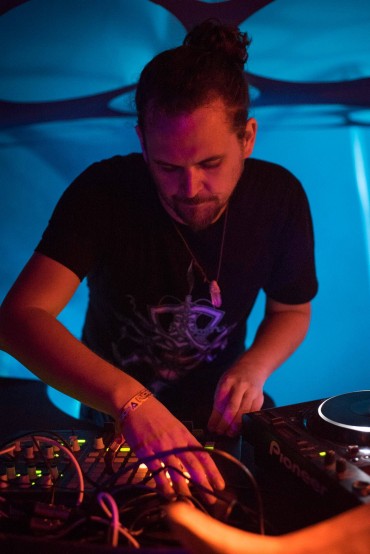 You have said that you think of today’s artists and musicians as natural shamans. If they are in fact healers, and their art is the medicine, do you believe all art and music is essentially curative? Or can some be detrimental to healing?
You have said that you think of today’s artists and musicians as natural shamans. If they are in fact healers, and their art is the medicine, do you believe all art and music is essentially curative? Or can some be detrimental to healing?
I like to speak to the highest potential in people, but of course it swings both ways. Everything has a dark side. Marilyn Manson said, “Music is the strongest form of magic.” Magic, music, medicine… All can be used for healing and transformation OR manipulation and control. It’s the intention with which it is used—the consciousness encoded within the music. It can awaken and unite millions of people, or drain an entire generation of its money, intelligence and ambition. It’s powerful juju.
The healing mechanism works via resonance. It’s about whether the vibrational profile of the music is what you need to feel at that time. I often hear of people who were into super aggressive dark music when they were rebellious teenagers, but now they can’t stand to listen to it. The same piece of music can be medicine at one time, and poison at another time. It depends on your state of being, your environment, etc.
Dancing is a form of active healing—like exercise, play, social bonding and creativity all at the same time—and music is the medicine for it. If your relationship to music and dance is not healing you or not making you a better person, then it’s not the right medicine for you. For example, some people need solitude, yoga, tranquility, etc., and being in a party environment can lead them astray or drive them nuts.
So it’s not about ultimate cures and panaceas—it’s about the right medicine and the right intention in the right setting at the right time. And this is where the role of the shaman and the DJ overlap.
American poet Henry Wadsworth Longfellow once said, “Music is the universal language of mankind.” Most of us have heard this phrase in some variation or another before, and researchers studying the effects of music on members of different cultures have proven that the statement is essentially true.
With that considered, electronic music seems to be rising in popularity in every pocket of the globe—from major cities to desert parties to the jungles of Central America. If music is indeed our universal language, what do you think it is about electronic music that makes it so suited to such varied physical, cultural and sonic landscapes?
Great question! I think electronic music resonates on a more fundamental level, beyond language, beyond culture. It speaks not to our ego, but to the basic underlying geometry and harmonic structure of our minds and bodies and to our essential humanness. It originates from the template level of reality—mathematics, harmonic numbers, ideal forms, sine waves, etc.—and the focus on danceability means the rhythms are usually resonant with universal human body characteristics. Of course, this isn’t true of all electronic music, but I think it’s particularly true of psychedelic music, which is why the scene is so global and multi-cultural.
Among other things on the horizon, you’re starting to teach more courses on music production… Can you tell us about what called you to teaching and what a would-be student might experience in one of your classes or retreats?
Well, I used be an academic—I love teaching, lecturing and mentoring—so it comes as second nature to me. I began doing one-on-one music production training about three to four years ago —the “Psychedelic Jedi Course”—and I’ve developed that into a huge amount of content and a structured workflow-oriented approach to making electronic music of any style. In March 2016, I’m hosting a four-day “Audio Alchemy Retreat” in Hawaii. We’ll be going deep into music production, as well as lots of related topics such as harmonic science, music business, lifestyle, etc., and have interactive sessions to help people with their own projects. It’s the culmination of everything I’ve learned and experienced—a huge transfer of knowledge which will knock years off the student’s self-directed learning. It’s limited to 20 places, but I hope to make this into an annual event, with different speakers and attendees each year.
You’re currently wrapping up a new album. Care to leave us with any teasers of what to expect?
Well, I came to Central America in search of a new sound, and I’m pleased to say it’s coming together beautifully! I spent the first few months developing a new approach designed to minimize “churn” and keeping the creativity flowing. I started dozens of new projects to test this approach for many different tempos and rhythms. In the end, I have picked out nine of them for the album and I’m currently in the process of finishing them off.
A broad range of tempos are represented and there is a lot more melodic expression than in my previous work. The production and sound design has developed significantly due to some amazing new tools and techniques I’ve gained over the last few years. Stylistically, it’s definitely still “psy-tech-funk,” but rhythmically, it’s a bit of a departure from the more trance-oriented beats of previous years.
∴
At a time when sounds from the underground serve as an increasingly powerful undercurrent influencing more recognizable musical styles, the American electronica scene seems poised to experience its most diverse year of music to date. Artists like Hedflux are beginning to shift their gazes toward our flourishing festival landscape and musical hubs. With imminent releases and collaborations from Hedflux on the horizon, his mesmerizing creations and performances will undoubtedly set powerful ripples of influence in motion both domestically and abroad, adding new depths to an already-vibrant world of art and sound and illuminating the path ahead for contemporaries and future generations of creators alike.
Stay ahead of the curve by exploring new and upcoming releases on Hedflux’s musical label, Luminus Music, and keeping an ear to the ground for word on his first appearances in the United States beginning this spring!

